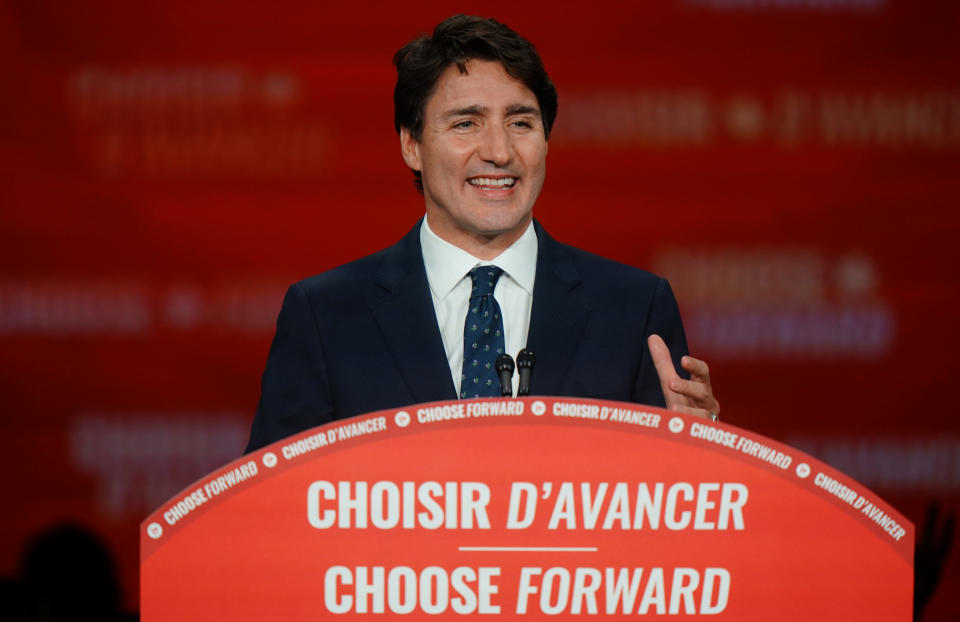What the Liberal government is planning for taxes

The Liberal Party of Canada managed to hold on to a minority government on Monday after campaigning on a platform focused on affordability for the middle class and featured slew of tax cuts – but questions still remain about how the party will handle the government’s fiscal situation.
A recent survey of Yahoo Canada readers found that tax policy was the most critical issue of the 2019 election. More than 20 per cent of the 20,264 responses ranked taxes as the No. 1 issue of the election, followed by immigration (19 per cent) and climate change (12 per cent).
With the Liberals now set to form a government, but having to turn to other parties for additional support, here’s a breakdown of the promises made during the campaign and how those might hit your wallet.
More money earned tax-free
The Liberals ran on a promise to increased the basic personal amount that you can earn without having to pay taxes by $2,000 to $15,000 for those making less than $147,000. H&R Block tax expert Lisa Gittens said in an interview that the increase – which will be spread out over the next four years – will have an impact on taxpayers, leaving them with slightly more money in their pockets.
“This increase we know is going to affect middle class and lower income taxpayers,” Gittens said, adding that she doesn’t expect the Liberals to have to change this promise in order to gain additional party support.
“This is in the ballpark of what others were looking to do.”
Tax the rich
At the same time, the Liberals campaigned on a promise of hitting higher-income earners with a 10 per cent luxury goods tax on purchases of cars, boats and aircrafts worth more than $100,000.
But the party may have to bring in more taxes on richer Canadians to get support from the NDP, which ran on a promise of implementing a 1 per cent wealth tax on those with a net worth of more than $20 million.
Bank of Montreal chief economist Douglas Porter wrote in a note Tuesday that he expects the NDP to pressure the Liberals on their tax policy, particularly when it comes to wealthy Canadians.
“The NDP will surely look to increase taxes on higher-income earners or wealthy Canadians,” he wrote.
But Gittens is doubtful how effective the NDP’s proposed wealth tax could be in Canada.
“The truth is, if you have assets in excess of $20 million, they’re not sitting in a bank account,” she said, pointing to the luxury goods tax as a potentially more effective method.
“It’s going to be difficult for him to impose that because those assets have already been sheltered. He is more likely to come alongside the Liberals now and say okay, maybe we can’t get to the $20 million, but we can definitely affect those purchases.”
Trying to tackle housing affordability
Another issue that came up frequently on the campaign trail – especially in Toronto and Vancouver – was housing affordability.
Among the promises the Liberals made on the housing front was implementing a national tax on vacant residential properties owned by foreigners who don’t live in Canada.
In its analysis of that promise, the Parliamentary Budget Officer warned that the level of compliance to that tax will depend on policy design as well as the response in B.C., where a similar tax is in place.
So far, it’s unclear the impact this policy would have on the housing market.
“You can see them focusing on generating tax revenues from those who have the resources to pay it. But how much would that generate? That’s where we’re going to have to wait and see,” Gittens said.
But what about the deficit?
Still, some are concerned with the government’s fiscal situation overall and the rising debt levels that come alongside with an increase in spending.
“Their broken promise to balance the budget combined with no forward-looking plan to balance in the foreseeable future was already going to lead to rising debt,” said Aaron Wudrick, the federal director of the Canadian Taxpayers Federation.
“Throw in new demands from other parties in exchange for parliamentary support in a minority situation and deteriorating economic conditions and we could be looking at significantly larger deficits than forecast.”
Indeed, Porter wrote in a note Tuesday that it’s “highly likely” the budget deficit will widen with a minority government at the helm.
“It’s not yet crystal clear where the major spending changes will come from. Even the Liberals were projecting larger deficits in the coming years compared with this year’s budget, and that was before any specific demands from other parties,” Porter wrote.
“The bottom line here is that the already-wider deficits laid out in the Liberal platform only mark the starting point, and will likely be shaded even wider.”
Download the Yahoo Finance app, available for Apple and Android.

 Yahoo Finance
Yahoo Finance 
